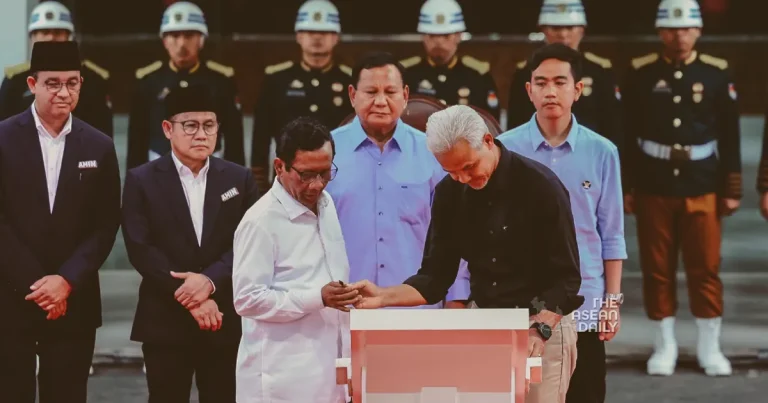6-1-2024 (JAKARTA) Campaign teams supporting rival candidates to Mr. Prabowo Subianto, the leading contender in Indonesia’s February 14 presidential election, have reportedly been holding secret meetings to discuss strategies to undermine his lead. Sources involved in the campaigning process have revealed that supporters of Mr. Anies Baswedan and Mr. Ganjar Pranowo are collaborating to exchange information and plan their moves, citing allegations that Mr. Prabowo’s camp has been resorting to aggressive tactics, such as removing their opponents’ election posters with the help of security officers.
Speaking anonymously, a campaign strategist for Mr. Ganjar stated, “Our teams at the grassroots level have been informally connecting with the Anies camp to explore ways of outmaneuvering the Prabowo camp. Our banners and flags were taken down, so we are working together to protect our campaign materials.” A senior campaign manager from one of the camps added, “Our relations with the Anies and Ganjar camps are good and flow naturally, driven by a sense of solidarity. Our grassroots supporters do not engage in confrontations.”
While Mr. Prabowo is leading his rivals in various opinion polls, there is a possibility that he could lose the election if he fails to secure over 50% of the votes on February 14, leading to a runoff between the top two candidates on June 26. If his opponents join forces and consolidate their votes in the second round, they could potentially surpass the defense minister.
According to the strategist, there is an understanding that if Mr. Ganjar advances to the second round, the Anies camp will support and endorse him, and vice versa. The two camps have also agreed to collaborate in gathering evidence of rule violations committed by Mr. Prabowo during the campaign, which could be used to file a complaint. Indonesia’s election law allows for an election result to be challenged if prior structured, systematic, and massive breaches of rules can be proven.
Members of Parliament from Mr. Ganjar’s Indonesian Democratic Party of Struggle, which holds the largest number of seats in the House, have raised concerns about an incident in November 2023, where police officers in East Java were allegedly seen assisting in hanging campaign posters for Mr. Prabowo and his vice-presidential running mate, Gibran Rakabuming Raka, the eldest son of President Joko Widodo.
Mr. Sufmi Dasco Ahmad, head of strategy coordination in Mr. Prabowo’s campaign team, has dismissed these allegations as baseless, citing Mr. Prabowo’s significant lead in the opinion polls. According to a survey conducted by the Jakarta-based think-tank Centre for Strategic and International Studies between December 13 and 18, Mr. Prabowo garnered 43.7% support, while Mr. Anies received 26.1% and Mr. Ganjar received 19.4%.
In November, a video went viral showing civil security officers in Pematang Siantar, North Sumatra, removing billboard posters of Mr. Ganjar and his running mate Mahfud MD. Additionally, amateur videos from December 30, 2023, captured an incident in Boyolali, Central Java, where a group of Mr. Ganjar’s supporters and six soldiers engaged in arguments on the street, resulting in the soldiers assaulting the civilians, leaving seven injured, two of whom required hospitalization. The military is currently investigating the case.
Reports have emerged that Mr. Anies’ campaign team filed a complaint against West Java’s acting governor, Bey Machmuddin, accusing him of showing preferential treatment to national politicians campaigning in his jurisdiction. The armed forces commander, Agus Subiyanto, has pledged to maintain neutrality in the 2024 election, warning that any military personnel involved in practical politics would face criminal charges and consequences from their superiors. The military is also establishing posts across towns to encourage local residents to promptly report any suspicion of military officers engaging in political activities.
National police spokesman Ahmad Ramadhan has reiterated that all policemen are bound by the law, which prohibits them from participating in any activities that could be seen as supporting any candidates. They are also prohibited from attending or speaking at political events.
Indonesia’s elections, held every five years, encompass presidential and vice-presidential races, as well as parliamentary seats at the national, provincial, and regency levels across the vast archipelago. With 205 million eligible voters, it is one of the world’s largest democratic exercises.




